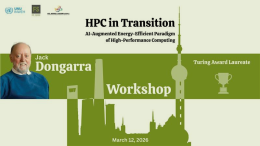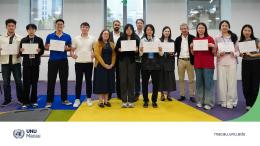In June 2023, The UN Secretary-General, António Guterres, expressed concerns about the potential risks of generative AI, emphasizing the urgency of addressing these warnings. This working paper calls for international governance to guide transformative technologies, particularly focusing on ‘foundation models’ like GPT-4 and DALLE-2, which underpin a wide range of AI applications. The paper aims to contribute to the UN's consideration of AI governance strategies and the agenda of the newly announced Multistakeholder Advisory Body on AI.
The paper is divided into three main sections:
Foundation AI models and their unique challenges should be the central focus of the UN’s AI governance efforts.
This section highlights the rapid development of foundation AI models and the governance challenges they pose. It identifies issues in governing these models during their development, deployment, and oversight phases. Concerns include the potential for rapid progress leading to societal risks, opacity in these models, and the concentration of safety expertise and resources in a few private companies, primarily in the US. These challenges hinder international regulation efforts, especially for the UN.
No existing institutional model can be “copy-pasted” to respond to the risks from frontier AI.
The report acknowledges that existing institutional models cannot be directly applied to address the risks posed by frontier AI. While current proposals for international institutions offer valuable governance mechanisms, they have limitations in terms of enforceability, agility, and applicability. The report suggests that addressing international AI governance requires a multi-pronged approach.
Any UN international institution charged with AI governance should focus on norm and consensus-building, rather than a technical regulatory mechanism.
The report proposes that any UN international institution responsible for AI governance should prioritize norm and consensus-building over technical regulatory mechanisms. Given the UN's limited technical oversight capabilities in foundation AI, the Multistakeholder Advisory Body on AI should advocate for equitable benefits distribution, amplify the voices of less powerful actors, and promote universal norms within AI. The report argues that the UN is uniquely positioned as a global authority to address the challenges posed by AI.
The report offers specific recommendations for the Multistakeholder Advisory Body on AI to enhance the UN's capacity for governing foundation models. These recommendations include maintaining human control, promoting international convergence on best practices, conducting multinational consultations on global AI risks, engaging with leading AI companies for safety scrutiny, supporting regulation development, facilitating knowledge transfer, and promoting public accountability.
In conclusion, the report suggests a pragmatic approach for the UN to shape AI development for the global good. Instead of rushing into creating enforceable international regulations, it recommends building a framework for an effective international regime complex for AI over time. This strategy leverages the UN's strengths in building international norms and consensus while allowing for the necessary technical development to occur gradually.



